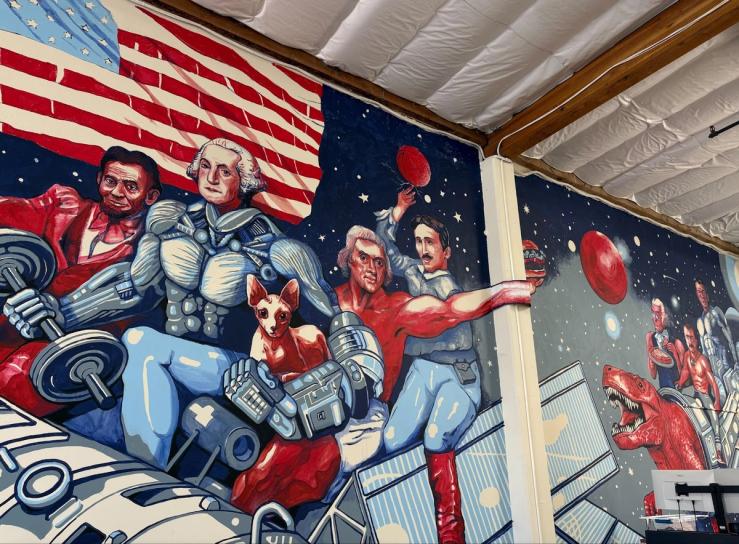The Signal Insight
Baiju Bhatt became a billionaire after co-founding Robinhood, the zero-commission online brokerage that became synonymous with the 2021 meme-stock craze. His ambitions for his next act may be more outlandish. Aetherflux, the company Bhatt launched after leaving Robinhood last year, is trying to turn a science fiction idea that Isaac Asimov first sketched out in 1941 into commercial reality: capturing solar power in space and then beaming it down to earth.
Others — including NASA, where Bhatt’s father worked — have pursued the idea before and given up. Bhatt’s twist on Asimov’s concept is to deploy a constellation of small satellites in low Earth orbit, from which to transmit power to small ground stations using infrared lasers. He aims to reach parts of the globe where traditional delivery of power or fuel is difficult, expensive, or dangerous. Bhatt has identified the US Department of Defense as a possible early adopter, and as Aetherflux plays into President Donald Trump’s “energy dominance” agenda, it has secured an undisclosed amount of funding from the Pentagon.
Aetherflux has raised another $50 million from more traditional startup funders including Andreessen Horowitz, Bill Gates’ Breakthrough Energy Ventures, and Bhatt’s Robinhood co-founder, Vlad Tenev. It will take another “hundreds of millions, if not billions” to put Bhatt’s plan into action, he acknowledges, but he is planning to launch a “demonstration mission” within a year.
The Stanford physics graduate is leaning into his startup’s sci-fi image, decorating one wall of its offices in San Carlos, California, with a madcap, retro-futurist mural featuring bionic presidents, a space-suited bald eagle, and a giant American flag against a galactic backdrop. The country’s capitalist economy, where entrepreneurs are willing to put risk capital on the line for a venture like his, “sets America apart,” Bhatt believes. And he hopes to let more people “live out their dreams of the cosmos.”
His pursuit of the resources needed to bring an unproven concept to life is an extreme example of the task facing most startup founders. Here’s how Bhatt’s trying to “yank [Asimov’s idea] from the pages of science fiction and manifest it in the world.”
This interview has been condensed and edited for clarity.
Andrew Edgecliffe-Johnson: Can we start with the space lasers? This sounds like sci-fi. What makes you think it might work?
Baiju Bhatt: This was the meaty challenge that I was looking to sink my teeth into [after Robinhood]. My motive was to take something which looked and felt like science fiction, and try to make it a science reality — and to build a business in the process. Our approach from the beginning has been: How can we [develop] this capability with existing building blocks, without needing to have individual scientific breakthroughs? It means that most, if not all, of the components for our demonstration mission are either commercially available or are modifications to things that are commercially available.
How do you raise funds for something that has been tried in the past and failed, which might take years to pay off?
I say pretty often that space is hard and space is expensive. And one of the fun parts about this is just being very open and direct about [the fact that] we’re working on a very, very difficult problem. That being said, I’ve done this before. I’ve built a pretty big company. And this is a big and bold mission that we’re pursuing. So while our path towards getting there is going to be challenging, and it’s going to be a long-term one, we’re trying to tackle one of the foundational pillars of the economy. Even putting aside the financial opportunity, this has the potential to be transformative and those things tend to be pretty interesting. If you can make them happen, they change the world.
What did you learn from Robinhood that has been valuable to you in founding Aetherflux?
A part of what makes this intellectually compelling to me is that it’s not the exact same thing. Because why does a person go from finance to starting a space company? It’s because you want a challenge. There’s a lot of parts of building a company that are transferable, like team-building, recruiting, fundraising, communications, telling the story of the company, making sure that there are clear goals in mind, and orienting people towards a mission. There’s also a magic and a camaraderie that comes from working together on a small team on something. Hopefully, when people join a company like this, they want to do the work that is going to be some of the most exciting, impactful work of their life. And the way that you get people to sign up for something like this is you speak to that. You say, ‘If we can do this, we change the way that humans interact with space.’
What percentage chance do you put on this working out?
Will it be successful? Hopefully. Are we going to work hard to make it successful? Yes. Personally, looking at those 10 to 15 years [at Robinhood], what is the thing I’m trying to relive? The thing I’m chasing is the uncertainty, working on something where not a lot of other people are working on it. But I, in my mind’s eye, have an inclination that this is the right thing to do, and that the path to doing it is the way that I foresee it’s going to play out. And [looking back and asking myself], ‘How did you, Baiju, solve the problem along the way, so that you found your way out of the uncertainty?’ I miss the times when I didn’t know, and then I did know.

Tell me about the wall art.
It’s 20 feet tall, and it’s probably 80 feet wide. The concept behind this is the painting of George Washington crossing the Delaware. But instead of on a boat, I wanted him crossing the Van Allen [radiation] belt on a satellite. Then I wanted to have the founding fathers or important US presidents, shirtless and ripped. We’ve got Nikola Tesla, Thomas Jefferson, a hairless cat, George Washington, and Abe Lincoln. Over here we have a T-Rex. That’s Ben Franklin, with a Chippendales kind of thing going on. There’s Teddy Roosevelt, there’s [Ronald] Reagan. That’s me — and Tupac [Shakur].
Notable
- Arizona-based Solestial raised $17 million in May to continue funding its space-based solar panel technology, indicating there is strong investor interest in the once sci-fi concept.
- Space energy experts have recently warned US lawmakers that the nation could fall behind China in the race to harvest solar power from space.



